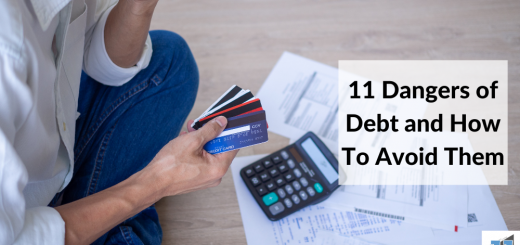10 Alarming Warning Signs of Debt Problems
Debt can easily derail your financial goals. If you don’t recognize the warning signs of debt problems, your debt can build up to an unmanageable level over time.
From overdrawing your bank account to maxing out credit cards to only making minimum payments, here are ten critical warning signs that you have a problem with debt.
1. You’re Constantly Overdrawing Your Bank Account
Do you always find yourself trying to time your bills and overdrawing your bank account? You may be spending too much money and digging yourself further into debt.
If you pay non-sufficient funds (NSF) fees multiple times a month, you are currently living on the financial edge.
Solution: Take an audit of your spending. Go through the past three months of bank and credit card statements, taking the time to categorize each transaction. This will show you where your money has been going. From there, you can find areas where you are overspending and make adjustments.
2. You’ve Maxed Out a Credit Card (or Five)
Regularly using credit cards without paying them off each month will cause your balance to grow over time. If you run out of available credit on one (or more) of your cards, you are probably spending more than you make.
Even if your cards aren’t maxed out, using more than 30% of the available credit on your cards can be one of the biggest warning signs of debt problems.
Solution: Stop using your credit cards until you get your balances under control. Instead, use a debit card and cash for your monthly spending. If you cannot keep up with your monthly obligations, you will need to reduce your spending. This could involve only buying necessities to help you stay away from additional credit card debt.
3. You Are Only Making the Minimum Payments
When you have credit cards or other revolving debt and are only making the minimum payments, you may be in serious trouble. Minimum payments are designed to pay the least amount possible on the principal of your debt while collecting the majority of your payment as interest.
Solution: If you can only afford minimum payments, you should set up automatic payments on your debt to stay current. You will then need to put together a plan (like the debt snowball) for paying down your debt balances. This may include creating a budget and looking for ways to bring in extra money each month.
4. You Are Regularly Getting Calls From Debt Collectors
Are debt collectors calling you regularly? If so, this is a sign that you have a problem with debt.
Collection agencies purchase your debt from your creditors once you are delinquent on your payments. Then, they call constantly to collect on that debt. Oftentimes, they add exorbitant interest and fees to your bill.
Debt collectors use aggressive tactics to collect on your debt. They will threaten wage garnishment and repossession to get you to agree to a payment plan. This can feel overwhelming and cause added stress to your current financial situation.
Solution: Know your rights when communicating with debt collectors and don’t agree to anything that is not in writing. Figure out what you can afford to pay and work with them to come up with a reasonable payment plan. If you can’t pay the debt off in full, try to negotiate a lower payoff amount (in writing) to stop the harassing phone calls.
5. You Can’t Get Approved for a New Loan or Credit Card
When you have been rejected for a loan or credit card due to a low credit score or your current debt load, you likely have a debt problem. Getting denied can feel like a punch in the gut. However, it should cause you to assess your situation and stop you from taking on additional debt.
Solution: If you don’t believe your debt load is too high, get a free copy of your credit report and review the details to see if there are any mistakes. If everything looks accurate, continue paying down your debt to increase your credit score and lower your debt-to-income ratio.
6. You’re Losing Sleep Over Your Debt
Stressing out over money is all too common, especially if your debt balances keep going up. If you are stressed out every time you see a credit card bill in the mail or wonder how you will ever pay off your student loans, know that this is one of the warning signs of debt problems.
When you notice yourself being kept awake at night by the thought of your financial situation, your debt is probably weighing on you more than you know. Anxiety, depression, and other mental health issues can arise from having too much debt.
Solution: Understanding your total financial picture can help calm your fears and lower your stress about your debt. Putting together a budget for all your monthly expenses is the first step. You can then organize all your debt using something like the Undebt.it Debt Snowball tool to see exactly how much debt you have and how to pay it off quickly.
7. You Can’t Pay Your Bills on Time
Do you juggle your bills between paychecks? If you find yourself trying to time your paychecks with your bills and you regularly pay bills after they are due, your debt may be to blame.
In fact, you may be covering your bills with borrowed money or adding to your credit card debt just to make your monthly bill payments. This cycle is a sign that you are in serious debt.
Solution: If you are struggling to keep up with your bills, you can usually move your billing due dates to work better with your paycheck cycle. This can help you “time” your billing due dates around when you get paid. But, if you are spending more than you make, you need to find ways to cut expenses or increase your income.
Related: 10 Simply Monthly Budget Templates in Google Sheets
8. You Lie About Your Debt to Close Family and Friends
If you find yourself hiding your debt from those you trust the most, it may be a bigger issue than you think. Not being able to share the basic details of your finances with your loved ones means that you are probably ashamed to admit how much debt you have.
This is understandable. Debt can feel like you’ve failed to manage your finances well.
Keep in mind that debt is totally normal. Millions of people struggle with debt and have a tough time sharing the details of their financial life.
Solution: The first step in taking control of your finances and paying down your debt is admitting to yourself that you have a problem. When you face your current reality, you can start making changes to improve your situation and get the support of your loved ones along the way.
9. You Have No Savings
You may feel like you’re doing ok financially. However, you may be one disaster away from putting yourself further into debt if you have no savings.
Furthermore, if you are spending all of your money to cover your bills and debt payments, this is a sign that you may have too much debt.
Solution: Make a monthly budget to see what your REAL expenses are and determine how much you actually NEED to spend. Then, pay the minimum amount on your debts and cut expenses to start accumulating savings. You should have at least one month of expenses in an emergency savings account to prevent you from going further into debt.
10. You Debt-to-Income Ratio Is over 43%
Your debt-to-income (DTI) ratio is how much money you allocate toward debt vs. your regular monthly income. If you are spending more than 43% of your income on debt payments each month, you are in serious debt.
The Federal Reserve recommends that debt payments (including your mortgage) make up no more than 43% of your income at any given time, with no more than 28% of that total being your mortgage. For renters, they recommend staying at 20% DTI or below.
Solution: Focus on paying down your debt with the highest monthly payments to lower your debt-to-income ratio. You can even use the Undebt.it tool to organize and pay off your debts with the highest monthly payment first.
How to Get Out of Debt
Getting out of debt requires a commitment and a strategy. If you have any of these warning signs of debt problems, putting together a debt payoff plan and sticking to it will help you pay off debt.
Consider using Undebt.it’s tools to help you organize and track your debt payoff progress. Undebt.it can also help keep you motivated and allow you to find the most efficient way to become debt-free.



